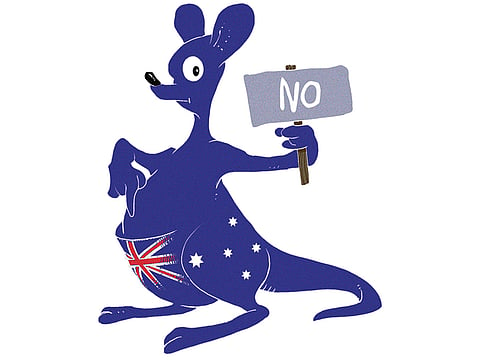Global opinion is against Australia
A change of leadership has calmed things down at home, but abroad, the country is still seen as the lucky, rich, cruel nation. Perhaps it’s time for Aussies to revisit history

There was a time, not so long ago, when being Australian brought with it a frisson of pride and, dare I say it, quiet superiority. Young, modern, proudly multicultural, Australians saw themselves as a nation of free thinkers, open minded and open hearted about sexual orientation and race. As travellers to Europe and the United Kingdom, there was a sense of great freedom and smugness being an Aussie: Class differences? Pfft, not them. And have you seen the size of Sydney’s Mardi Gras? Migrants brought the best food and coffee in the world — from Italy to Vietnam, Greece to Iran. You name it, Australia has got it. (OK, sport hasn’t always been a source of national pride.)
If you were an immigrant child growing up in Australia, life wasn’t exactly a bed of roses, but you could be sure that someone would quickly take your place as the underdog in the playground. First it was the Chinese then the Italians and Greeks, then came the Vietnamese and Cambodians who were followed by the Lebanese and Pacific Islanders who were followed by ... well, you get the picture.
A nation built on wave after wave of immigration, Australia was quick to acknowledge and respond to the roadblocks of systemic discrimination. It’s easy to forget that in 1978, New South Wales became the first state to launch a Commission of Inquiry (disclaimer — led by my father) to root out built-in obstacles and replace them with policies to promote harmony and diversity. By the end of the decade, every state and territory had a statutory body to nurture multiculturalism. Anti-discrimination laws followed, enshrining equality regardless of gender, race, sexual preference. Equally, when the HIV/Aids epidemic exploded in the 1980s, Australia led the world with its swift and resolutely humane response. The then-health minister, Dr Neil Blewett, ensured Australians were the pioneers, launching innovative and life-saving preventive public health campaigns that became templates for many other nations. A decade on, Australia trail-blazed once again to become the third country in the world (after Switzerland and the Netherlands) to acknowledge young people were dying and new ways had to be found to keep them alive as they battled their demons.
Parliament thumbed its nose at a cynical commentariat and legislated for a medically supervised injecting room. These were decades when Aussies roamed with pride and the world looked on enviously as scores of new national parks were created, the Great Barrier Reef was given World Heritage status, a gutsy conservative government outlawed automatic weapons in the wake of a civilian massacre in Tasmania and the very idea that hunting be allowed in wilderness areas would have been considered suicidal by both political sides.
Today, Australia’s stubborn defence of coal mining and denial of its effect on global warming — combined with the lack of cogent policy to encourage new, sustainable energy programmes — conflicts with pretty much the rest of the globe. Its deals with poorer countries to host refugees, in exchange for aid, while cutting the foreign aid budget, has made international headlines, as did the recent, shocking treatment meted out to Australia’s most prominent Indigenous footballer, Adam Goodes. The reality of being an expat Australian these days is that more often than not, it’s about apology not pride.
At home, the change in political leadership seems to have brought a palpable sense of relief. But in the eyes of a European Union agonising over the greatest migration crisis in a century, Australia remains the wealthy, lucky country that boasts of wide open spaces, a relatively small, ageing population, a robust economy, single-digit unemployment — and sends back the boats of desperate refugees. What better way to cement the suspicion that Australia has become a nation driven by short-term interests over the common good.
Australia’s human rights policies were last week singled out for criticism by no less than 100 countries, 61 of them focusing on Australia’s treatment of people seeking asylum. Among them are key allies including the United States, the United Kingdom, Germany and France. The UN review, says Paul Power, CEO of the Refugee Council Of Australia, shines a light on how out-of-step Australia has become with the international community: Australia is alone in the world in having policies of mandatory indefinite detention for people seeking asylum, offshore processing and the forcible return of asylum seeker boats. The continued detention of children, in particular, is a source of international embarrassment.
Review from our peers around the world shows how far Australia has slipped with its insular, unsustainable approach to vulnerable people who need help. Australians, I’m quite sure, remain a generous and tolerant bunch who would be deeply shocked by how they are now perceived in many parts of the world. Perhaps, it is time for Australians not only to remind themselves of the stultifying effects of their geographic isolation, but to demand an end to the kind of expedient foreign and immigration policy that allows both sides of politics to wreak such damage on society itself. In 2015, the inescapable fact is that there are close to 60 million displaced men, women and children seeking a home. Of course, for Australians, it matters how they are perceived by the rest of the world. But what they choose to do matters much, much more.
— Guardian News & Media Ltd
Paola Totaro is an Australian journalist and writer specialising in European affairs, politics, social policy and the arts.



